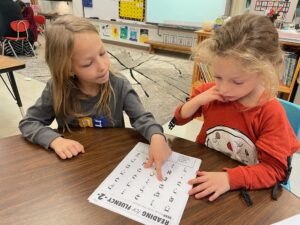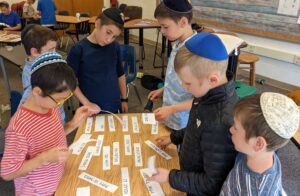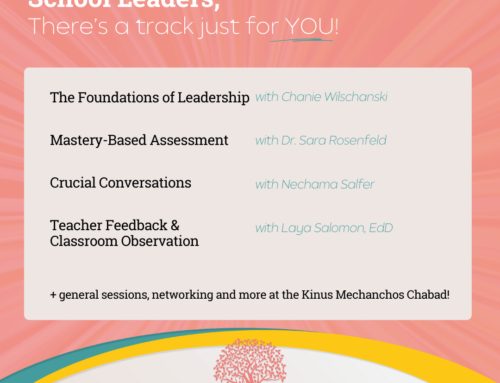 Meet the Chinuch Shluchim: Rabbi Zalmy and Mashie Frankel (nee Marcus) both teach at Bader Hillel Academy in Milwaukee, Wisconsin, and compare it to their days in Crown Heights.
Meet the Chinuch Shluchim: Rabbi Zalmy and Mashie Frankel (nee Marcus) both teach at Bader Hillel Academy in Milwaukee, Wisconsin, and compare it to their days in Crown Heights.
This Week: Rabbi Zalmy and Mashie Frankel became Chinuch Shluchim at Bader Hillel Academy in Milwaukee, Wisconsin just nine months ago.
They share their journey to this unique Shlichus, and the incredible ways they instill skills and a love for Yiddishkeit in every student, no matter their background.
Rabbi Frankel teaches fifth and sixth grade Chumash and Gemara; Mrs. Frankel teaches first grade. They’re also the proud parents of three young children.
What was the journey like from where you grew up to where you are now?
Mashie: When we got married four years ago, we knew we wanted to go on Shlichus. We thought of more the typical Chabad house, similar to the way I grew up in Mission Viejo, CA. My parents, Rabbi Zalman and Bassie Marcus, do a little bit of everything, catering to the needs of the community.
Zalmy: I’m from Los Angeles, where my parents were sent on Shlichus to be teachers. My father, Rabbi Simcha Frankel, still teaches fourth grade. He works incredibly hard as a teacher, and growing up, I wasn’t sure if teaching was something I wanted to do. My parents are also involved in the community, opening their home to many Shabbos guests and Mekuravim.
Mashie: We lived in Crown Heights when we got married, and after a year of Kollel, Zalmy started teaching. He became an assistant at Darchei Menachem, and the next year became a teacher. I was teaching preschool at Lubavitch Yeshiva. Then this opportunity came up. We were open to the idea of continuing to teach but we wanted to live somewhere where we would still have a Shlichus, even if it wouldn’t be our main responsibility.
 What is the difference between teaching in an Lubavitcher school in Crown Heights vs. the one you are in now?
What is the difference between teaching in an Lubavitcher school in Crown Heights vs. the one you are in now?
Zalmy: It’s very different. I don’t have a specific class I’m with all day, like I did at Darchei. The students come to my classroom for their Chumash and Gemara periods. It’s a big mix of kids, with different backgrounds. Some aren’t yet frum, and others are from Lubavitch and Shluchim homes, so that makes the focus of how and what we are teaching different.
How do you cater the learning to your diverse student body?
Zalmy: It’s a big challenge. For instance, some kids will ask basic Emuna questions, and others try to defend Yiddishkeit … so I create a dynamic where everyone is allowed to share and ask and learn from each other. I’m constantly trying to switch between teaching the basic skills that a kid needs to go to Yeshivah, while giving an appreciation for Chumash and Gemara to all my students, even those who don’t plan to go to Yeshivah.
What do you do to give a love of learning to each type of student?
Zalmy: We focus on reading and translating when it comes to Chumash, but the bigger focus is communicating the meaning of the Pesukim: first of all basic meaning, such as Rashi, but also taking lessons from the text. We just had a project about Jewish leaders. We were learning about Moshe becoming a leader, so each kid had to research a Jewish leader, a project which might have not been done in a mainstream Lubavitch school. Hopefully this will give them an appreciation for Jewish leaders, Moshe, and Chumash.
 Mashie, do you also have students from a mix of backgrounds in your classroom?
Mashie, do you also have students from a mix of backgrounds in your classroom?
Mashie: Yes, but it’s not felt as much in the younger grades. They’re just starting to learn reading and writing. Skills wise, they all get the same foundation, no matter their background. Some of the kids are already able to read Tehillim, and some of the kids are struggling with reading and Nikudos. It’s cool to see how they all start with the same kind of base and work up.
What are some things that you found rewarding so far?
Mashie: I just had one of my student’s mothers tell me that her daughter has been wanting to wear skirts now at home. She also asked to pick up her siddur from school to use over the summer so she can daven at home.
What is something unique that you each feel you bring to the classroom?
Zalmy: I try to engage students in the learning, and structure my class in a way that encourages them to discover the questions on their own. I have them perform skits and do creative projects, and I see how much it motivates them to learn and go deeper. I also try to understand and connect with each kid. I try to relate to them on their level.
Mashie: Every morning our class has a “morning meeting,” where the kids can talk about their weekend, or what they are looking forward to in the coming week. At lunch I try to sit with them and chat. I try to make Yiddishkeit fun, so we try to do a Parsha treat every week, and hands on centers for Kriah and Kesivah activities.
 Teaching is hard. What keeps you going?
Teaching is hard. What keeps you going?
Zalmy: For me, I think it’s the kids. When I’m in a classroom and I start teaching, it motivates me. I might be tired before the class, but I think the energy from the kids motivates me. I also remember that you don’t need to reinvent the wheel. It’s great to collaborate with other teachers.
Mashie: I think about how this is our Shlichus. This is what we’re here for. Thinking about that motivates me to do my best in the classroom.
What would you tell another couple who is considering making Chinuch their Shlichus?
Zalmy: It’s necessary, especially nowadays. This is our future. We’re the ones to have an impact on how these kids grow up – being a mentsh, having purpose, being a Yid. We have to give the kids today the tools they need to get through this Golus. It’s also rewarding to have an impact on a child’s life.
What is your role in the community?
Mashie: We live in a community with a Chabad house, with three other Shluchim families. We feel that we are all in it together. We are part of the Shluchim of Wisconsin and attended their Kinus this year. We go to shul, we bring our kids to shul , and invite people for Shabbos. We talk to people and are there for them. Since the Shul is an older community, the congregants get great joy from seeing our kids.
We also try to do Shlichus with the families in our kids’ classes – like the moms and the kids come for playdates, especially the ones who live in Bayside, so we’re involved in outreach through the shul and through the preschool. We’re all here to do Shlichus, and we’re all one team.




